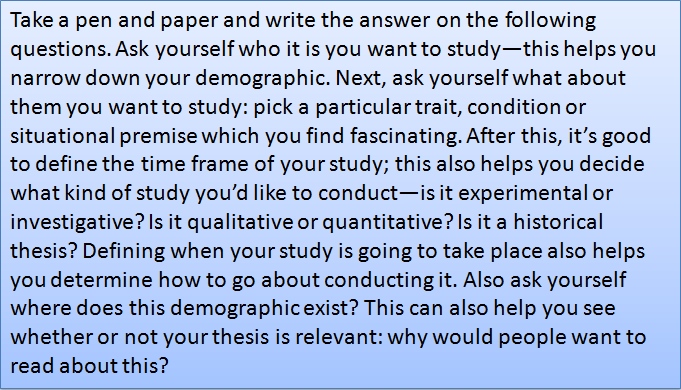
Lesson 4: What Makes A Good Thesis?
In this first part of our class, we discuss the different qualities which make a good thesis.
Objectives:
- To enumerate the different qualifiers of a good thesis
- To point out ways in which this can be achieved
Quick Navigation through the Lesson 4:
Before we can begin planning for or writing our thesis, it is important for us to first understand what makes a good thesis statement and subsequently, a good thesis paper. In this lesson, we’ll be discussing the different qualifiers for an effective and excellent thesis. We’ll also be taking a look at the different things which affect the quality of our thesis and how we can use these factors to our advantage.
A Good Thesis Statement
A thesis statement pertains to the sentence which sums up what your study is about. A good thesis statement is always concise and straight to the point. Furthermore, for a thesis statement to be effective, it should be specific—the worst thesis statements are those which are vague or too general because they’re unable to address a specific topic, problem or condition. Furthermore, vague thesis statements can often be misleading—they can also set researchers up for failure because the reach of the study is too great for the researchers’ capacities. A thesis also has to be narrow and focused so that it is interesting: don’t just ask yourself what you want to write about (e.g. drug addiction), but what about that topic you want to write about (e.g. the effects of crystal meth on the mental health of young mothers living in Texas). A good exercise to employ when writing your thesis statement is to ask yourself the basic questions: who, what, when, where, why, and how?
Exercise to Narrow Down Your Thesis Topic

Adequate Research
Research is an essential part of writing your thesis. As with any academic paper, any claims or generalizations which you make should be backed up with evidence. When writing a thesis, you have to ground all your premises in pre-existing arguments about the topic or at least about related topics. This makes your information credible. It also saves you time because it provides you with knowledge to bank upon. For example, if you’re studying “the effects of crystal meth on the mental health of young mothers living in Texas”, it would be a good idea to study the different cases of meth addiction in Texas by visiting certain rehabilitation facilities and asking for their help. This would provide you with commonalities between cases, thus making your thesis stronger.
One of the many reasons why some thesis papers fail is that they are inadequately researched—it is often the case that researchers get lazy and make invalid arguments. Or else they fail to address certain problems which may arise during their methodology. Doing proper research for your paper helps you build the backbone for your framework. Without it, your thesis falls apart.
Clear Scope & Limitation
Your scope and limitation sets the premise for what your paper will and won’t cover—not only does it set the context for your paper, it’s also a determining factor in the expectations of your panel. If, for instance, you are very vague about the scope and limitations of your study, you run the risk of over-exciting your panel: let’s say you forget to mention that your study only conducted a correlational study and your panelists expect to see a causal result because you failed to state otherwise—you may get a failing grade because the study will seem to have failed to achieve what it set out to accomplish. You have to be as clear-cut about this as possible: know what your study can and can’t achieve. When determining this, you must take into account your time frame, resources and abilities as a researcher.
In this lesson we were able to talk about what makes a good thesis—we were able to determine that a good thesis is clear, concise and credible. Given this knowledge, we now have an idea of how to go about planning for and writing our thesis.
[WpProQuiz 158]
Next up for this part of our lesson, we talk about how to properly determine your thesis’s audience. We’ll discuss why this is important along with the different factors which we need to take into account when deciding this. We’ll also talk about knowing this is crucial to the success of your thesis paper.

 + 1-888-827-0150
+ 1-888-827-0150 + 44-20-3006-2750
+ 44-20-3006-2750









